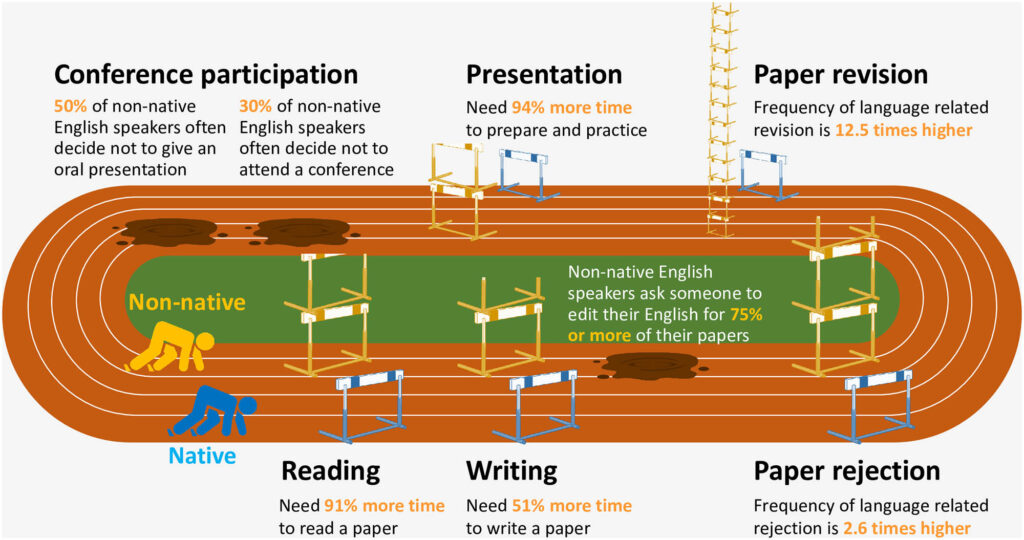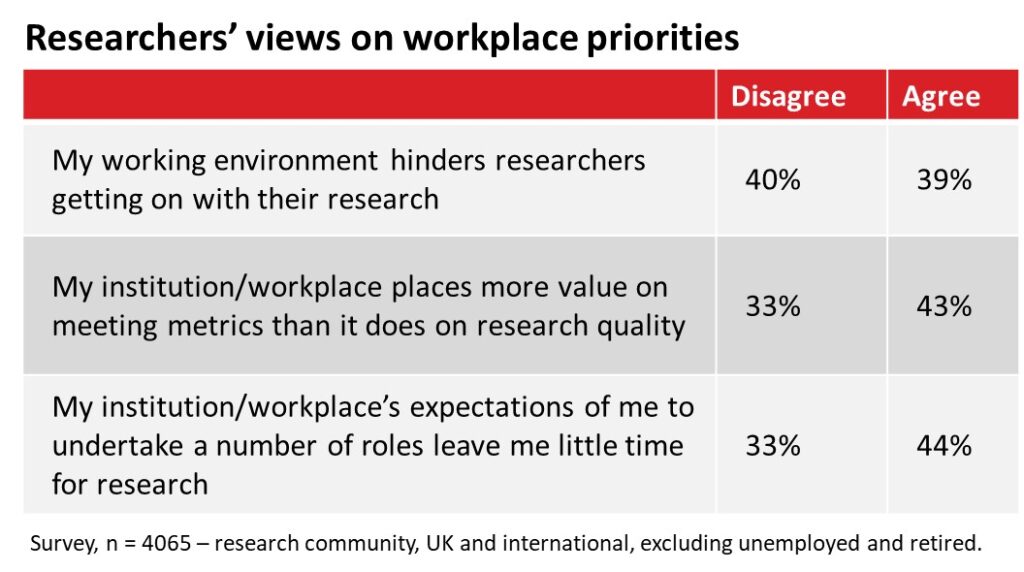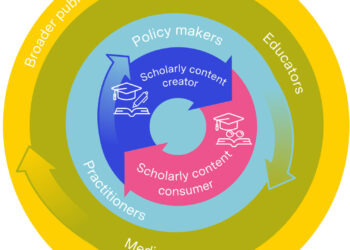Editor’s Note: Today’s post is by Roohi Ghosh. Roohi is the ambassador for researcher success at CACTUS. She is passionate about advocating for researchers and amplifying their voices on a global stage.
The academic world demands nothing short of excellence, with an unyielding pressure to produce innovative and impactful research outcomes. A growing body of evidence indicates that academic and commercial research suffer from systemic issues that can have far-reaching consequences on researchers, including stress, burnout, and various emotional and physical health challenges. These can have a detrimental effect on the individual researcher, the quality of their research output, and the overall working environment. These challenges are even more pronounced for non-native speakers of English. Non-native English speakers who published an English-language paper report having to overcome much greater hurdles than their native English-speaking counterparts.

Why are these researchers feeling burdened? And what can be done to lighten the load and make the academic environment more diverse, equitable, inclusive, safe, and welcoming?
Rising expectations mirroring seismic shifts in academia
The expectations placed on researchers have evolved significantly over time, mirroring seismic shifts in the scientific landscape and the broader societal context. Historically, researchers conducted research within the boundaries of their own specific disciplines. This emphasis on specialization and a comparatively narrower range of responsibilities allowed for a more linear approach to research.
Today, however, the percentage of international research collaborations is on the rise and has grown from 22% to 24% between 2015 and 2019. Research is no longer confined to a single discipline or method; researchers are often expected to navigate an intricate web of interdisciplinary complexities.
Owing to this rise in international collaborations, researchers are facing mounting pressure to transcend the boundaries of their individual disciplines. The demand for cross-disciplinary insights and innovative problem-solving has ushered in an era of greater expectations, requiring researchers to develop skills beyond their core expertise.
Advancements in technology have also transformed the research landscape, making data analysis and computation central to most scientific inquiries. This shift has burdened researchers with the need to adapt to sophisticated analytical tools and methodologies, further increasing the complexity of their roles.
Moreover, the competitive nature of academia and the pursuit of funding have contributed to the rising expectations on researchers. Securing financial support and recognition necessitates not just producing impactful work but also communicating that impact to the general public — all within limited time constraints and while juggling multiple responsibilities.
Adding to these pressures is the rising significance of open access (OA) in the academic world. OA journals often require researchers to shoulder publication costs, handle more extensive peer-review processes, and comply with specific copyright and licensing regulations. As a result, researchers may find themselves facing additional financial burdens and administrative complexities.
Is it reasonable to expect any individual to become truly proficient in such a diverse array of skills? From subject matter expertise to writing, teaching, mentoring, networking, presenting, designing, formatting, and technological proficiency, the list of demands is extensive. Are we inadvertently promoting mediocrity and moving away from the pursuit of excellence rather than fostering innovation? Is more value being given to metrics than to research quality? Is career progression dependent on being able to demonstrate success across a variety of diverse skills?

Disrupting the status quo: Transformative measures for streamlining publication processes
The traditional academic publishing model has long been considered the gold standard for disseminating research findings. However, this conventional approach often comes with its own challenges, like lengthy review processes, high publication costs, and unclear journal guidelines. As the research landscape continues to evolve, there is a growing need to disrupt the status quo and implement transformative measures to streamline publication. It is vital to explore innovative solutions that have the potential to revolutionize academic publishing and enhance the efficiency and impact of research dissemination.
First and foremost, a crucial step towards easing the burden on authors is to establish consistency and standardization among processes that can be standardized. While each journal serves a specific scientific community with its unique focus and requirements, having a set of standardized guidelines can ensure that published research aligns with the journal’s scope and quality standards. It raises the question of why these guidelines cannot be standardized, at least for journals within the same field, which would alleviate the need for authors to re-format and re-submit their work if it is rejected.
To cater to authors from non-native English-speaking backgrounds, journals could consider exploring the possibility of translating journal guidelines. Even better, should publishers start accepting manuscripts in local languages and provide translation as a value-added service? Simplifying the process of declarations of conflicts of interest, authorship, ethical considerations, and data availability statements through an online form could also make it easier for authors.
Researchers are often confused about tracking their submissions as they go through the publication process; is there a way for these status indicators in journal online systems to be standardized with the aim of making it easier for researchers to understand the status of their submissions? Additionally, setting up automated email notifications to inform authors about potential delays and providing tentative decision timelines could reduce anxiety and uncertainty for the author.
Networking and attending conferences are other areas researchers find stressful. Can journals and academic societies incorporate training on networking and collaboration, as part of their structured training programs, author engagement plans, or membership benefits? This value-added offering would not only benefit authors but also contribute to the overall advancement of the research community.
Conference organizers also can offer design support for posters and presentations, ensuring that researchers can present their work effectively and professionally. Additionally, to foster inclusivity, providing interpreters at conferences can enable non-native speakers to communicate in their local languages, creating a more equitable and supportive environment.
Research communication is also something that authors sometimes struggle with. How should authors communicate their work to a broad audience? Is it important? How should they go about creating video summaries or infographics? What role can publishers and academic societies play in supporting research communication? Can they help disseminate these alternate content formats on popular regional platforms such as WeChat in China and Line in Japan, to reach broader audiences.
Furthermore, offering support and consultation for authors on the next steps of their research journey or providing a point of contact within the journal, akin to a friend or mentor, can be beneficial for authors and contribute to building stronger relationships with the research community.
It is time now for academia to become more author-facing and to understand the challenges faced by researchers at the ground level. One way that journals could do this is to conduct periodic surveys to gather feedback from authors about their experiences with the publication process. These responses could provide valuable insights. This feedback can then be used to identify areas for improvement and implement changes based on authors’ needs and preferences.
What should change?
65% of respondents in a survey felt tremendous pressure to publish papers, secure grants, and complete projects. It was also found that 31% reported working 50 hours or more per week with reasons ranging from external pressures to internal drive and passion. However, the toll of such excessive hours can affect emotional and physical well-being.
This pressure can lead to burnout and hinder creativity and innovation.
By exploring the different solutions discussed, institutions can take steps to create a more supportive and collaborative research environment, valuing quality over quantity and fostering a culture that values impactful and rigorous research.

Nearly half (49%) of respondents also indicated that on top of these pressures, they had too many non-research responsibilities at work. Standardizing journal workflows and publication processes and streamlining administrative tasks will help free up a researcher’s time and energy, allowing them to concentrate on what they do best — research.
Instead of having the researcher do everything and master a diverse set of skills, let’s go back to the drawing board and reflect on the essential skills a researcher must absolutely possess. Let’s have them focus on that. Let’s build a society where we value innovation over anything else.
Discussion
1 Thought on "Guest Post — Academia’s Versatility Demand: Examining the Pressure on Researchers to Master Diverse Skills"
To alleviate these problems, the European Association of Science Editors (EASE) published EASE Guidelines (in 31 languages), EASE Quick-Check Table (in 16 languages), EASE Ethics Checklist, and EASE Form for Authors. These solutions still need to be promoted in the scientific community. See https://ease.org.uk/publications/author-guidelines-authors-and-translators/



